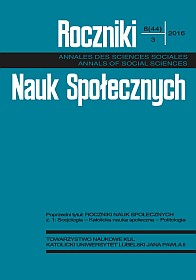The Democraticness of the Vote Weighting Systems in the Council of the European Union
Abstract
The aim of the paper is to determine whether the Lisbon double majority system better meets the criteria of democraticness than the Nice system. In order to answer this question the voting systems in the Council of the European Union – the Nice system was compared with the current system of double majority. The article analyses the concordance of these voting systems with the principle of equivalence of vote. The research shows that formal voting power in the Nice system is more proportionate to the square root of the number of population than in the Lisbon double majority system. The democraticness of the voting system in the UE was also weakened by including to the population member states inhabitants who are not their citizens.
References
Baldwin R., Widgrén M.: Winners and Losers Under Various Dual-majority Voting Rules for the EU’s Council of Ministers, “CEPS Policy Brief”, 2004, nr 50.
Banzhaf J. F.: Weighted Voting Does not Work: A Mathematical Analysis, „Rutgers Law Review”, 19 (1965), nr 2, s. 317-343.
Bielawska A., „Nicea albo śmierć”, czyli polski dyskurs polityczny na temat Traktatu ustanawiającego Konstytucję dla Europy i jego wpływ na stosunki polsko-niemieckie, „Środkowoeuropejskie Studia Polityczne”, 2012, nr 2, s. 237-257.
Conway G.: Recovering a Separation of Powers in the European Union, „European Law Journal”, 17 (2011), nr 3, s. 304-322.
Czaputowicz J.: Demokracja a suwerenność w Unii Europejskiej, w: Polska w procesie integracji europejskiej: dekada doświadczeń (2004-2014), red. K. Wojtaszczyk, M. Mizerska-Wrotkowska, W. Jakubowski, Warszawa: Wydział Dziennikarstwa i Nauk Politycznych UW 2014, s. 147-166.
Dann P., Looking through the Federal Lens: The Semi-parliamentary Democracy of the EU, “Jean Monnet Working Paper”, 5/02.
Decyzja Rady (UE, Euratom) 2015/2393 z dnia 8 grudnia 2015 r. w sprawie zmiany regulaminu wewnętrznego Rady, „Dziennik Urzędowy Unii Europejskiej” L 332, 18.12.2015.
Eurostat, Population without the Citizenship of the reporting Country (dane z roku 2014), http://ec.europa.eu/eurostat/tgm/web/_download/Eurostat_Table_tps00157FlagDesc_56058361-b81d-43d6-9cff-8291ad3eec6e.xls [dostęp: 7.01.2016].
Felsenthal D.S., Machover M.: Analysis of QM Rules in the Draft Constitution for Europe Proposed by the European Convention, „Social Choice and Welfare”, 23 (2004), nr 1.
Felsenthal D.S., Machover M.: The Measurement of Voting Power. Theory and Practice, Problems and Paradoxes, Cheltenham, Northampton: Edward Elgar 1998.
Galster J., Łachacz O.: Kilka uwag o podziale władzy w Unii Europejskiej, „Studia PrawnoUstrojowe”, 2014, nr 26, s. 63-76.
Kirsch W.: On Penrose’s Square-Root Law and Beyond, w: Power, Voting, and Voting Power: 30 Years After, red. M.J. Holler, H. Nurmi, Heidelberg–New York–Dordrecht–London: Springer 2013, s. 365-387.
Kirsch W., Machover M., Słomczyński W., Życzkowski K.: Voting in the EU Council – A Scientific Approach, http://www.esi2.us.es/~mbilbao/pdffiles/voting.pdf [dostęp: 19.04.2016].
Kleinowski M.: Konsensualne negocjacje czy głosowanie, kontestowanie aktów prawnych w Radzie UE, “Studia Europejskie”, 2012, nr 4(64), s. 27-50.
Kleinowski M., Siła państw w Unii Europejskiej. Formalno prawne wyznaczniki siły państw w Radzie UE i Radzie Europejskiej, Toruń: Wydawnictwo Adam Marszałek 2014.
Kleinowski M.: Siła państwa w Unii Europejskiej. Pozaformalne wyznaczniki siły państw w Radzie UE i Radzie Europejskiej, Toruń: Wydawnictwo Adam Marszałek 2015.
Lenaerts K.: Some Reflections on the Separation of Powers in the European Community, „Common Market Law Review”, 28 1991, nr 1, s. 11-35.
Letter to the Governments of the EU Member States, Scientist for a Democratic Europe, http://www.wahlrecht.de/news/2004/12-openletter.pdf [dostęp: 19.04.2016].
Neyer J., Europe’s Justice Deficit: Justification and Legitimacy in the EU, w: Political Theory of the European Union, red. J. Neyer, A. Wiener, Oxford: Oxford University Press 2010.
Penrose L.S.: The Elementary Statistics of Majority Voting, „Journal of the Royal Statistical Society”, 109 (1946), nr 1, s. 53-57.
Plechanovová B.: Draft Constitution and the Decision-Making Rule for the Council of Ministers of the EU – Looking for Alternative Solution, „European Integration online Papers (EIoP)” 8 (2004), nr 12, s.
Pollack M.A., Shaffer G.C.: Risk Regulation, GMOs and the Limits of Deliberation, w: Unveiling the Council of the European Union. Games Governments Play in Brussels, red. D. Naurin, H. Wallace, Houndmills–Basingstoke–Hampshire: Palgrave Macmillan, s. 144-164.
Protokół (nr 36) w sprawie postanowień przejściowych, „Dziennik Urzędowy Unii Europejskiej” C 326, 26.10.2012.
Rozporządzenie Parlamentu Europejskiego i Rady (UE) NR 1260/2013 z dnia 20 listopada 2013 r. w sprawie statystyk europejskich w dziedzinie demografii, „Dziennik Urzędowy Unii Europejskiej” L 330, 10.12.2013.
Speech to the European Council – 13 December 2012 by Martin Schulz, President of the European Parliament, http://www.europarl.europa.eu/former_ep_presidents/president-schulz/en/press/press_release_ speeches/speeches/sp-2012/sp-2012-december/html/speech-to-the-european-council---13-december-2012-by-martin-schulz--president-of-the-european-parliament [dostęp: 12.05.2016].
Traktat o funkcjonowaniu Unii Europejskiej (wersja skonsolidowana), „Dziennik Urzędowy Unii Europejskiej” C 326, 26.10.2012.
Copyright (c) 2016 Roczniki Nauk Społecznych

This work is licensed under a Creative Commons Attribution-NonCommercial-NoDerivatives 4.0 International License.


